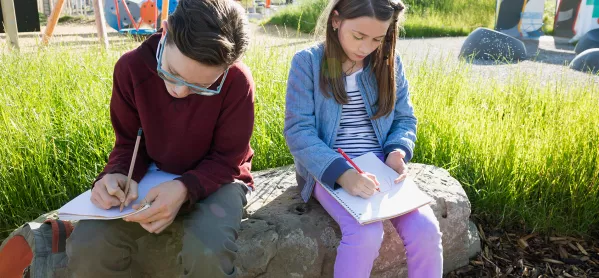Learning in peer interactions takes many forms -from relatively structured peer tutoring programmes, such as peer-assisted learning strategies and cross-age learning, to more naturalistic, untutored learning that takes place during peer interaction.
Research into the success of these measures has been somewhat mixed, with existing reviews and meta-analyses reporting generally positive outcomes but with quite a lot of variance in the size of the associated effects (such as Shenderovich, Thurston and Miller, 2016).
Read more: Six tips for perfect peer assessment
From the magazine: The reading project that helps both adults and students
Listen: Why you shouldn’t write off peer learning
However, in a study recently published in British Journal of Educational Psychology, Dr Harriet Tenenbaum and colleagues aimed to explore the peer learning that happens in the absence of explicit tutoring, and what factors might be associated with more successful outcomes.
The benefits of peer learning
In this meta-analysis, the group examined 71 datasets from across 62 published papers, comprising more than 7,000 children aged between four and 18 from across the globe.
Overall, they found that peer interaction is associated with several beneficial learning outcomes, across a range of skills and concepts, such as puzzle completion, route planning, mathematics and verbal memory - including compared to when children were working individually on the same task.
However, this finding has a number of important caveats that mean that there is a wide range of effects dependent on the context of the learning that taking is place.
For example, contrary to the researchers’ expectations, there were no important differences related to the age or gender of the children involved, or the group size.
This doesn’t mean, though, that we shouldn’t think about all of these factors when we plan group learning activities, especially in relation to children’s age.
This is because the way in which learning between peers might happen likely shifts across developmental stages: younger children may look to acquire knowledge from others in the group, while older children may be better able to collaborate to complete a task.
Social loafing
On the other hand, older children show a greater tendency to slack off during group activities - otherwise known as social loafing - and there is a rich literature on addressing this phenomenon in group work.
Advice includes recommending looking at the difficulty of the task (more complex tasks reduce loafing in groups), how meaningful the task is to group members and how far the group members will be evaluated on their own contribution (Karau and Williams, 1993).
Learning was also found to be positively influenced by whether or not the group was asked to reach a consensus. Specifically creating a situation of “cognitive conflict” in the group that they need to explore, negotiate and work through, not relying on passive conformity, leads to better outcomes.
Mixing in peer learning
What does this mean for the classroom?
Well, it is not possible, nor desirable, for an adult to work one to one or in small groups with all children all day. Inevitably, there will be opportunities across the day for children to work independently - either on a task individually or more casual “side-by-side” learning.
However, it seems clear that it would be useful for teachers to work in opportunities for genuine peer learning, perhaps on more complex tasks. The gains aren’t all academic focused either.
Group work provides an opportunity for children to build their socio-emotional skills, too, cultivating new relationships across the classroom, and learning how to listen, communicate, negotiate and collaborate.
Alice Jones is director of the Unit for School and Family Studies at Goldsmiths, University of London


